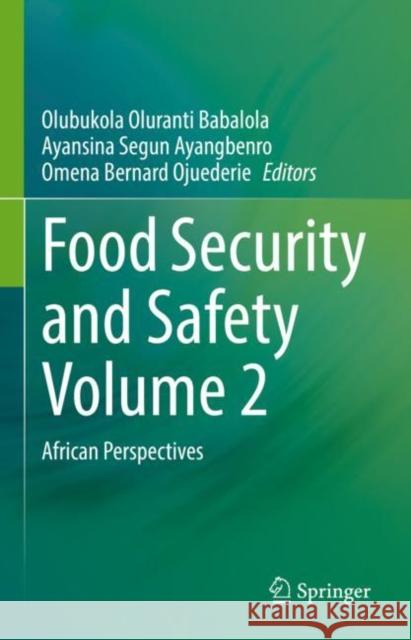Food Security and Safety Volume 2: African Perspectives » książka
Food Security and Safety Volume 2: African Perspectives
ISBN-13: 9783031096136 / Angielski / Twarda / 2022 / 483 str.
Food Security and Safety Volume 2: African Perspectives
ISBN-13: 9783031096136 / Angielski / Twarda / 2022 / 483 str.
(netto: 881,78 VAT: 5%)
Najniższa cena z 30 dni: 886,75
ok. 16-18 dni roboczych.
Darmowa dostawa!
Sustainable food production is a global challenge with respect to climate change and an ever-increasing world population. Conventional crop production using agrochemicals presents human health and environmental challenges. Rising concerns about environmental sustainability have increased attention toward improved, efficient, and sustainable means of crop production. Various strategies are employed in enhancing crop production to adapt and mitigate climate change and ensure food security. The future of food production relies on improving productivity without compromising long-term productivity and environmental sustainability. Feeding the ever-increasing world population would require concerted efforts by all stakeholders to combat the impact of climate change and numerous ecological challenges facing food production. Hence, innovative technologies and methods are indispensable in mitigating the effects on food security. The book looks at the current challenges and solutions, from an African perspective, regarding food safety and health management, food security and nutrition, climate change and sustainable food production, and forest resources and food security. The target audience is scientists, graduate students, researchers, academicians, and professionals in food production for sustainable development and ecosystem management. This book will also be helpful to policymakers and specialists in framing future feasible agro-ecosystem policies.
Sustainable food production is a global challenge with respect to climate change and an ever-increasing world population. Conventional crop production using agrochemicals presents human health and environmental challenges. Rising concerns about environmental sustainability have increased attention toward improved, efficient, and sustainable means of crop production. Various strategies are employed in enhancing crop production to adapt and mitigate climate change and ensure food security. The future of food production relies on improving productivity without compromising long-term productivity and environmental sustainability. Feeding the ever-increasing world population would require concerted efforts by all stakeholders to combat the impact of climate change and numerous ecological challenges facing food production. Hence, innovative technologies and methods are indispensable in mitigating the effects on food security. The book looks at the current challenges and solutions, from an African perspective, regarding food safety and health management, food security and nutrition, climate change and sustainable food production, and forest resources and food security. The target audience is scientists, graduate students, researchers, academicians, and professionals in food production for sustainable development and ecosystem management. This book will also be helpful to policymakers and specialists in framing future feasible agro-ecosystem policies.











